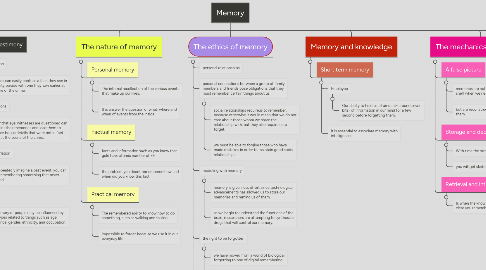
1. The nature of memory
1.1. Personal memory
1.1.1. The internal recollection of the various events that make up our lives.
1.1.2. It is answer the question of what, where and when of events from the inside.
1.2. Factual memory
1.2.1. facts and information such as you know that gold have atomic number of 79
1.2.2. the problem you deont remembered how and when did you know this fact.
1.3. Practical memory
1.3.1. The remembered ability to know how to do something, such as walking and talking.
1.3.2. impossible to forget because we use it in our everyday life
2. The mechanics of memory
2.1. A false picture
2.1.1. memories are not simply taken down from the shelf when we need them
2.1.2. but are reconstructed every time we access them.
2.2. Storage and decay
2.2.1. With time the strength of the memory weakens.
2.2.2. you will get sketch rather than a detailed copy
2.3. Retrieval and interference
2.3.1. Is when the knowledge you memorized are not clear you remembered just a part of it
3. Memory and knowledge
3.1. Short term memory
3.1.1. Employee
3.1.1.1. Our ability to hold small amount- around seven bits- of information in our mind for a few second before forgetting them.
3.1.2. it is essential to associate memory with intelligence.
4. Eye-witness testimony
4.1. Misidentification
4.1.1. Witnesses can easily confuse a face they see in an identity parade with one they saw earlier at the scene of the crime.
4.2. Leading questions
4.2.1. The way that eye-witnesses are questioned can easily taint their memories and lead them to remember bogus details that were not in fact present at the scene of the crime.
4.3. Imagination inflation
4.3.1. If you repeatedly imagine a past event, you can end up remembering something that never happened.
4.4. Stereotyping
4.4.1. Your memory of people may be influenced by stereotypes related to things such as age, appearance, gender, ethnicity, and occupation.
5. Memory and culture
5.1. Oral Culture
5.1.1. knowledge is limited to the collective memory of the group. This makes such knowledge very fragile.
5.2. Written culture
5.2.1. knowledge is preserved and carried on through objects either using drawings, or writing the information in books.
5.3. Internet culture
5.3.1. knowledge can be accessed anywhere in a click of a button, and most of the knowledge can be safely stored on the computer as it has a bigger memory and can store an immense amount of data.
6. The ethics of memory
6.1. personal relationships
6.2. personal connections between a group of family members and friends pose obligations that they must remember certain things about us.
6.2.1. social relationships requireus to remember, because otherwise it would mean that we do not care about those whom we share the relationship with. but they also require usto forget.
6.2.2. we must be able to forgive those who have made mistakes in order to maintain good social relationships.
6.3. meddling with memory
6.3.1. memory is given less effort since technological advancements has allowed us to store our memories and remind us of them.
6.3.2. as we begin to understand the functions of the brain, researchers are attempting to synthesize drugs that will control our memory.
6.4. the right to be forgotten
6.4.1. we have moved from a world of biological forgetting to one of digital remembering.
6.4.2. the absence of forgetting implies that digital remembering is ethically incorrect.
6.5. The politics of memory
6.5.1. Historical memory is kept alive through national reminders such as monuments, street names, and memorials.
6.5.2. Historical memory is a way to identify ourselves as citizens belonging to a certain nation or culture.
6.5.3. Historical memory raises questions regarding its ethics when it comes remembering the dark past of a country.
6.5.4. It could be argued that preserving terrible events of the past allows a chance or accountability and reconciliation.
6.5.5. On the other hand, it is feared that keeping such memories alive would lead to instability and vengeance.
6.5.6. Philosophers are concerned with the question of who should remember whose history and for how long should they remember it.
7. The reliability of memory
7.1. Can not be relied on
7.1.1. There are chances of forgetting and misremembering them.
7.1.2. Many of us have a difficulty with remembering
7.2. Misremembering
7.2.1. Creates an illusion of knowledge
7.2.2. Different people can have different memories of the same event.
7.3. Flashbulb
7.3.1. Are the dramatic experiences that don't leave our mind.
7.3.2. These types of memories are usually vivid, accurate and durable .
7.4. Memory biases
7.4.1. Egocentric bias:
7.4.1.1. recalling the past in a self-serving manner,
7.4.2. Narrative Bias
7.4.2.1. Imposing a structure on our memories in order to distort them and fit a predetermined story-line.
7.4.3. Emotional Bias
7.4.3.1. The memories that we recall are usually related to our current moods.
7.4.4. Vividness Bias
7.4.4.1. Remembering dramatic events than normal ones.
7.4.5. Hindsight bias
7.4.5.1. the inclination to see past events as being predictable; also called the "I-knew-it-all-along" effect.
7.4.5.2. the inclination to see past events as being predictable; also called the "I-knew-it-all-along" effect.
7.4.6. Source amnesia
7.4.6.1. The inability to remember where, when or how previously learned information has been acquired, while retaining the factual knowledge

